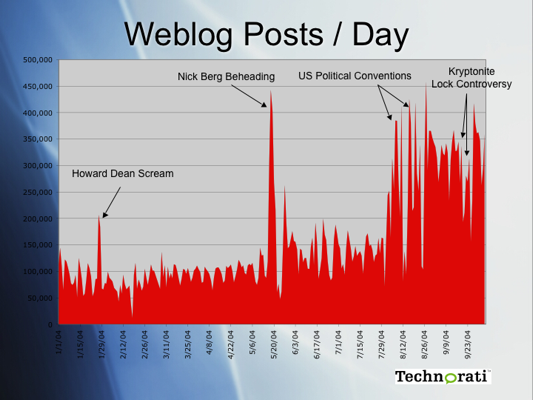This is part 2 of a series of posts describing the growth of blogging during 2003-2004 that is an expansion of the talk I gave at last week's excellent Web 2.0 conference. You can view Part 1, which covers the overall size of the blogosphere.
With the tremendous growth in the number of weblogs also comes an increase in the number of posts per day, also known as posting volume. This is an excellent proxy for the amount of time spent on blogging, because greater posting frequency means that more people are posting more often, and it also tends to validate the increased number of blogs that are out there. As of October 6, 2004, there are approximately 400,000 posts created every day in the blogosphere, which averages out to about 4.6 posts per second, or over 16,000 posts per hour. What is also interesting are the spikes in weblog posting, and the reasons for the spikes, as shown in the graph below (click on the graph for a larger view):
Many of the volume increases were due to political events. Large spikes occurred around the Iowa Caucuses (the Howard Dean scream), the time of the Nick Berg beheading, when both conservative and liberal bloggers posted prolifically on the new form of terrorist threat, and around both major American political conventions, where bloggers were feted as well.
However, other noteworthy spikes occurred around non-political news events as well. The blogosphere was abuzz around the discovery of a flaw in the basic mechanism of high-end Kryptonite locks, which made them vulnerable to picking with a dime-store plastic pen, and that news flew around the blogosphere for 5 days before mainstream media picked it up, which caused a second spike, as shown by a secondary spike in posting volume, as bloggers discussed the implications. A side note: I wonder how much Kryptonite could have done if their executives were keeping track of the blogosphere on a regular basis - it certainly could have helped to avert a major PR problem if they had reacted quickly and offered a recall or a fix before the news had broken in mainstream media. The story broke on 9/12/04 on a bicycle forum, but quickly spread throughout the blogosphere, with major mentions in the New York Times, the Boston Globe, and others.
Tomorrow, I'll look at the level of authority and influence that various blogs are attaining, and compare that with many traditional media sites.
